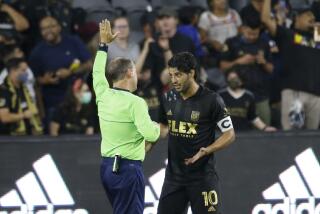NFL PLAYERS STRIKE: DAY 20 : NFL Management Sees Little Progress, Breaks Off Strike Talks
- Share via
TYSONS CORNER, Va. — The owners’ negotiators walked away from the bargaining table Sunday, dashing any hopes for a quick end to the nearly three-week-old National Football League strike. No further talks are scheduled.
Management blamed the break on the players’ continuing demands for free agency. The union said it was a deliberate move to put more pressure on the players to break ranks and cross picket lines.
“We’re at a roadblock, we’re mired down,” said Jack Donlan, who negotiated with union head Gene Upshaw for a little more than five days, the longest single bargaining session of the strike.
The 28 player representatives will meet today in Chicago, as they did a week ago, to plot their course and try to head off more defections.
After last Monday’s meeting, defections were about half what they had been in the first two weeks of the strike.
That meeting also led to the latest round of bargaining. The players, without saying specifically that they would change their demand for unrestricted free agency, approved a resolution which said they wouldn’t let any single issue stand in the way of an agreement.
But a lot more than a single issue was in the way in these talks, at which just eight minor articles of the 38 in the collective bargaining agreement were agreed upon. Several more cropped up. They included management’s demand for a contract that lasts six years instead of three and the players’ demand that the replacement games be removed from the record book.
Moreover, there seemed to be a different sense of pace between the two sides during these talks in line with the predictions of some players after last week’s meetings that they might be in uniform this week.
Where union spokesman Doug Allen kept insisting that progress could be made quickly, management’s John Jones insisted it would be a long, slow process.
The union, in fact, predicted that talks would break off on Saturday, and they almost did. The only talking on Sunday was about technical parts of the pension agreement.
Upshaw and Donlan not only disagreed sharply on free agency and two other major issues--the pension plan and management’s demand for a six-year contract--they also disagreed on just what the major roadblocks are.
Upshaw claimed that the players thought they could break the stalemate on free agency with a proposal this week that he said complied with management’s demand to stay within the present system.
That plan allows teams to make a qualifying offer with a guaranteed 20% raise, then match any offer made to a player. If the team lets the player sign with someone else, it gets compensation in draft choices based on his previous salary.
“They kept saying the major stumbling block was free agency,” Upshaw said. “Now we know it wasn’t free agency. It was really the pension and all the other issues they have on the table. Free agency is a smoke screen on the real issues which are really pension, guaranteed contracts and player rep protection and a whole list of things.”
Donlan flatly rejected the free agency proposal because it bases compensation on a player’s current salary rather than his new one. He said that based on the owners’ proposed entry-level salary scale, it would encompass every player whose first contract runs out below the proposed $120,000 salary line requiring compensation.
“What it does is maintain the labels we currently have but does away with the compensation,” Donlan said.
The disagreement on pension is basically the source of the money rather than the pay-out itself.
Management, which contends the players should be concerned only about the payout and not where the money comes from, is offering to increase pension benefits from $150 to $200 per month for every year of service, over the proposed six-year life of the contract. It would have contributions based on the profitability of the investments made by the trustees of the pension fund--three from each side.
The owners are also offering to add an additional $37 million to the fund, the $18 million surplus now the subject of a court battle stemming from the 1982 strike and $19 million that has accrued on interest from investments.
But the union, which says that money already belongs to the players, is asking that the present system of flat contributions by the owners be retained.
More to Read
Go beyond the scoreboard
Get the latest on L.A.'s teams in the daily Sports Report newsletter.
You may occasionally receive promotional content from the Los Angeles Times.










